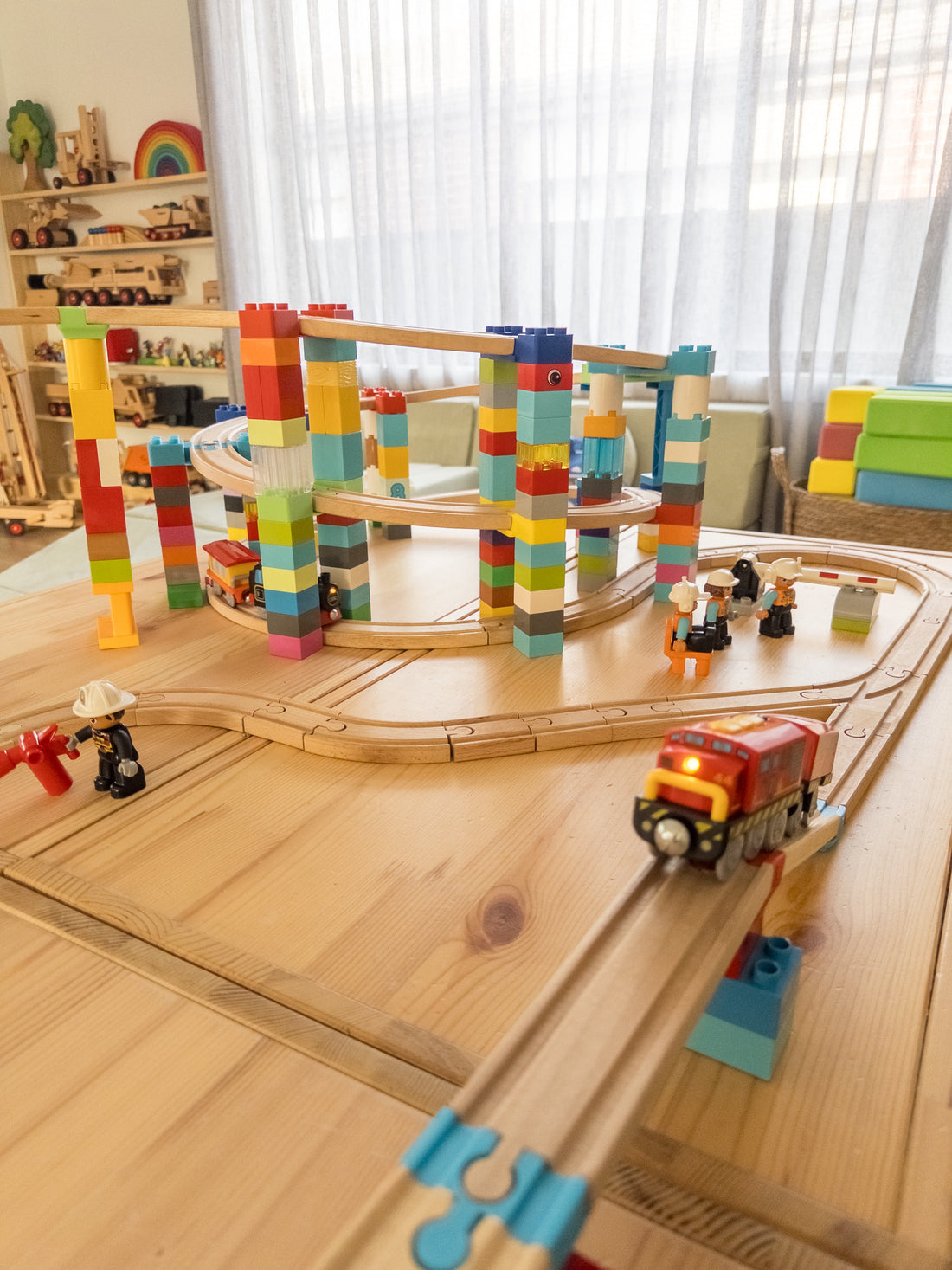
More Than Fun: The Social and Emotional Superpowers of Play
More Than Fun: The Social and Emotional Superpowers of Play
We all know play is important. It keeps kids busy, sparks imagination, and gives us those precious moments of peace (or at least a few quiet minutes with a cup of tea!).
But beyond the laughter, the tracks, and the make-believe stories, there’s something deeper going on — something powerful.
Play helps children develop the social and emotional skills they’ll use for the rest of their lives.
Whether they’re building bridges, navigating frustration, or inventing a story where a train saves the day, kids are learning how to express themselves, connect with others, and understand their own emotions — all through the joyful act of play.
Let’s take a closer look.
Play Builds Emotional Resilience
Life doesn’t always go to plan — and neither does a track build.
One minute everything is working perfectly. The next, the spiral collapses and the train won’t make it up the ramp. But instead of giving up, kids try again. They experiment. They ask for help. They persevere.
That’s emotional resilience in action.
And when children are given regular opportunities to navigate small frustrations in a safe, playful environment, they develop the coping skills they need to handle bigger challenges later in life.
In other words, every “oops!” moment on the floor becomes a stepping stone to emotional strength.
“When the track breaks or the train gets stuck, my son doesn’t give up like he used to. Now he says, ‘That’s okay, I’ll fix it!’ And that’s huge.” – Melissa, VIC
Play Teaches Self-Regulation
STEM play — especially with open-ended systems like Flexi Tracks — is full of tiny decisions.
-
“Where should this curve go?”
-
“How do I fix this ramp?”
-
“Should I start over?”
As kids build and explore, they learn to pause, assess, and plan their next move. That’s self-regulation — the ability to manage impulses and emotions — and it’s one of the most important life skills a child can develop.
Play gives them daily practice.
And the more they play, the more they learn to manage frustration, delay gratification, and stay focused on a goal. These skills don’t just help during playtime — they help in the classroom, at home, and beyond.
Play Fosters Empathy and Cooperation
When kids play with others — siblings, friends, or parents — they’re constantly stepping into someone else’s shoes.
They negotiate roles (“You be the train driver, I’ll be the builder”), share materials, wait their turn, and respond to each other’s ideas.
This kind of cooperative play is where empathy grows. Children begin to recognise how their actions affect others and develop the ability to see things from someone else’s perspective.
It’s not always smooth sailing — and that’s the point. Even small conflicts during play teach valuable social lessons, like:
-
How to apologise
-
How to compromise
-
How to celebrate someone else’s idea
-
How to listen and be heard
These are foundational emotional intelligence skills — and they’re all taught naturally through play.
Play Builds Confidence and Self-Esteem
There’s nothing quite like watching a child beam with pride over something they’ve built. Whether it’s a simple loop or a mega spiral around the coffee table, every success boosts their sense of accomplishment.
This is especially true with STEM play, where there’s no “right” way to do things — only endless ways to try.
Each new idea tested, each problem solved, each “Look what I made!” moment helps build a strong inner voice that says: I am capable. I can figure things out. I’m proud of myself.
And when kids feel confident in play, that confidence flows into other parts of their life — in school, in friendships, and in how they handle new challenges.
Play Is the Heart of Connection
Beyond all the skills, play is also how we bond.
When we sit on the floor and build with our children — even just for a few minutes — we’re telling them: I see you. I value your ideas. I want to be part of your world.
That connection is the foundation of emotional security. It tells kids they are loved, supported, and safe to be themselves — which is exactly what they need to grow.
Because when a child feels emotionally secure, they’re more likely to take risks, try again, and keep learning — even when it’s hard.
That’s the magic of play.
Let’s Raise Emotionally Strong Kids — One Track at a Time
Flexi Tracks isn’t just about loops and spirals. It’s about giving kids a space to build — not just with their hands, but with their hearts.
A space where they can explore feelings, learn social skills, and grow into confident, compassionate humans — all while having a blast.
So next time you step over a tangle of tracks, remember: it’s more than fun. It’s their emotional foundation taking shape.
👉 Ready to build resilience, connection, and confidence — one piece at a time?
Shop Flexi Tracks now and let the learning begin.
Shop Flexi Tracks now and let the learning begin.
